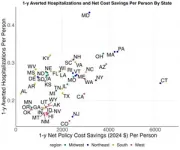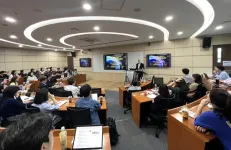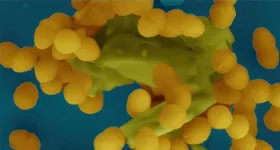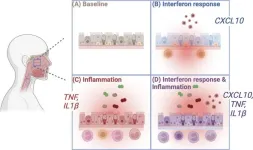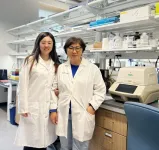(Press-News.org) With Donald Trump and other right-wing politicians increasingly using dehumanizing rhetoric to stigmatize immigrants coming to our nation's borders, doctors and other health officials should prepare for the resulting health consequences.
Such is the message of a “Viewpoint” article co-authored by UC Riverside professor Bruce Link and published Monday, July 1, in the Journal of the American Medical Association.
Link and his co-authors quote Trump as saying, “No, they’re not humans. They’re not humans. They’re animals,” at a recent rally in reference to immigrants wanting to cross U.S. borders.
When top political leaders engage in such rhetoric — rather than condemn it — stigmatization becomes more legitimized and pervasive in society, said Link, a professor of sociology and public policy, who also teaches at the Columbia University Mailman School of Public Health.
The harm goes beyond those seeking entry into the country. It also extends to groups viewed as associated with immigration, such as descendants of immigrants, and to people belonging to ethnic and racial groups with histories of global migration, Link and his co-authors say in the paper.
These groups then face ill health consequences.
Firstly, stigmatization increases stress, which causes or exacerbates a host of physical and mental health problems, including heart disease, gastrointestinal problems, high blood pressure, anxiety, depression, and sleep disorders.
It further makes people less likely to seek needed medical attention.
“It Inhibits people from feeling comfortable in pursuing things that matter to them and what they need, and one of those things is healthcare,” Link said. “Going to the doctor is a threat because of its connection to an authority. And this really intensifies when you worry that you're going to be treated differently, and negatively.”
Link and his co-authors urge doctors and other healthcare providers to be cognizant of and to better understand these health impacts and fears and concerns of their immigrant patients. They urge providers to work with community groups to make their approaches and facilities welcoming.
Link commended the UCR’s School of Medicine for teaching future doctors to learn about the “upstream situations” of their patients.
“Upstream means things that came before the health problem and that likely contributed to that problem,” Link said. “And that if physicians can learn to identify those things, it changes how they might relate to the person in front of them.”
Because the politicization of immigration is expected to continue, the paper further outlines areas that need research to better understand the costs of migration stigma. Such research should include probes into what extent immigrants lose status and face discrimination, and how much these effects extend to descendants of immigrants and to ethnic groups associated with them.
Researchers should further assess the long-term health consequences of stigmatization as reflected through policies that govern access to healthcare and what structural changes would better serve immigrant populations, the authors assert.
The paper’s title is “The human cost of politicizing immigration: migration stigma, U.S. politics, and health.” In addition to Link, its authors are Lawrence H. Yang, New York University School of Global Health; and Maureen A. Eger, Umeå University, Sweden, and the UC Berkeley Center for Right-Wing Studies.
END
Dehumanizing rhetoric on immigration harms public health
UCR professor & co-authors call for addressing the ill consequences of stigmatization
2024-07-01
ELSE PRESS RELEASES FROM THIS DATE:
A prosthesis driven by the nervous system helps people with amputation walk naturally
2024-07-01
State-of-the-art prosthetic limbs can help people with amputations achieve a natural walking gait, but they don’t give the user full neural control over the limb. Instead, they rely on robotic sensors and controllers that move the limb using predefined gait algorithms.
Using a new type of surgical intervention and neuroprosthetic interface, MIT researchers, in collaboration with colleagues from Brigham and Women’s Hospital, have shown that a natural walking gait is achievable using a prosthetic leg fully driven by the body’s own nervous system. ...
Novel blood test helps improve cancer treatments
2024-07-01
The earlier a cancer is detected, the better the chances that treatment will be effective. This applies to almost all types of cancer. Another crucial element in successfully treating patients is to individually assess the benefits and risks of individual forms of therapy and to regularly monitor treatment success. To do this, oncologists have a range of methods at their disposal, most notably imaging technology and invasive measures such as tissue biopsies, punctures and endoscopic procedures.
Analyzing gene fragments in the bloodstream
Researchers ...
Research-driven Korea University College of Medicine promotes joint research with global scholars
2024-07-01
Korea University's College of Medicine (Dean Pyun, Sung Bom) hosted the 1st Research Nexus Program in order to enhance international research network cooperation and vitalize global joint research.
This program shares the latest research trends and aims to invigorate international joint research by opening a seminar inviting top global scholars to promote international research performances.
The 1st program held an invitation seminar of Prof. Jeffrey D. Macklis, the "global authority in the field of neurogenesis" (Department of Stem Cell and Regenerative Biology at Harvard University).
Prof. Macklis ...
Degradation of cell wall key in the spread of resistance
2024-07-01
A study at Umeå University, Sweden, provides new clues in the understanding of how antibiotic resistance spreads. The study shows how an enzyme breaks down the bacteria's protective outer layer, the cell wall, and thus facilitates the transfer of genes for resistance to antibiotics.
"You could say that we are adding a piece of the puzzle to the understanding of how antibiotic resistance spreads between bacteria," says Ronnie Berntsson, Associate Professor at Umeå University and one of the authors behind the study.
The Umeå researchers have studied Enterococcus faecalis, which is a bacterium that often ...
The evidence is mounting: humans were responsible for the extinction of large mammals
2024-07-01
The debate has raged for decades: Was it humans or climate change that led to the extinction of many species of large mammals, birds, and reptiles that have disappeared from Earth over the past 50,000 years?
By "large," we mean animals that weighed at least 45 kilograms – known as megafauna. At least 161 species of mammals were driven to extinction during this period. This number is based on the remains found so far.
The largest of them were hit the hardest – land-dwelling herbivores weighing over a ton, the megaherbivores. Fifty thousand years ago, there were 57 species of megaherbivores. Today, only 11 remain. These remaining ...
Common respiratory infections may have protected children from COVID-19, study suggests
2024-07-01
Analyzing nasal swabs taken during the pandemic, researchers at Yale School of Medicine suggest that the frequent presence of other viruses and bacteria may have helped to protect children from the worst effects of COVID-19 by boosting their immune systems. Their results will be published July 1 in the Journal of Experimental Medicine (JEM).
Children are generally more susceptible than adults to respiratory infections such as the common cold, and yet, for unknown reasons, the SARS-CoV-2 virus tends to cause less severe ...
Ochsner Medical Center – Baton Rouge performs robotic-assisted lung biopsy
2024-07-01
BATON ROUGE, La. – Ochsner Medical Center – Baton Rouge now offers robotic-assisted bronchoscopy using the Ion robotic platform, a new, minimally invasive option for lung biopsy.
With bronchoscopy, doctors insert a long, thin tube with a camera to examine lung tissue and retrieve a biopsy sample. The Ion robot enables doctors to perform a biopsy quicker and safer than ever before.
These advancements are especially critical for treating lung cancer, since early detection is key to achieving the best outcome. Every six weeks of delayed treatment lowers ...
Daily sauna time might help prevent menopause-related weight gain
2024-07-01
Chicago (July 1, 2024) — New research performed with mice suggests that daily time in a warm environment such as a sauna might help older adults, especially women, combat age-related obesity and insulin resistance. The study shows the potential of heat treatments as a simple way to promote healthier aging.
The researchers found that older female mice receiving a daily 30-minute whole-body heat treatment gained less weight and showed improved use of insulin, which helps control blood sugar. The investigators ...
Researchers thwart resistant bacteria’s strategy
2024-07-01
Antibiotic resistant bacteria are experts in evolving new strategies to avoid being killed by antibiotics.
One such bacterium is Pseudomonas aeruginosa, which is naturally found in soil and water, but also hospitals, nursing homes and similar institutions for persons with weakened immune systems are home for strains of this bacterium. As many P. Aeruginosa strains found in hospitals are resistant to most antibiotics in use, science is forced to constantly search for new ways to kill them.
Now, at team of researchers from Department of Biochemistry and Molecular Biology and Department of ...
Finding the sweet spot in brain development
2024-07-01
Not everything in the brain is meant to last. As our brains assemble, trillions of neural connections have to be built or torn down at the right time and place. Otherwise, the seeds of disorders like autism can take root. Cold Spring Harbor Laboratory Assistant Professor Gabrielle Pouchelon studies how the brain is wired early in life. In doing so, she hopes to find the origins of various brain dysfunctions and new ways to treat them.
In a new study, Pouchelon and her team zero in on a process known as pruning. This is when the brain removes unnecessary connections between ...
LAST 30 PRESS RELEASES:
Rich medieval Danes bought graves ‘closer to God’ despite leprosy stigma, archaeologists find
Brexpiprazole as an adjunct therapy for cognitive dysfunction in schizophrenia
Applications of endovascular brain–computer interface in patients with Alzheimer's disease
Path Planning Transformers supervised by IRRT*-RRMS for multi-mobile robots
Nurses can deliver hospital care just as well as doctors
From surface to depth: 3D imaging traces vascular amyloid spread in the human brain
Breathing tube insertion before hospital admission for major trauma saves lives
Unseen planet or brown dwarf may have hidden 'rare' fading star
Study: Discontinuing antidepressants in pregnancy nearly doubles risk of mental health emergencies
Bipartisan members of congress relaunch Congressional Peripheral Artery Disease (PAD) Caucus with event that brings together lawmakers, medical experts, and patient advocates to address critical gap i
Antibody-drug conjugate achieves high response rates as frontline treatment in aggressive, rare blood cancer
Retina-inspired cascaded van der Waals heterostructures for photoelectric-ion neuromorphic computing
Seashells and coconut char: A coastal recipe for super-compost
Feeding biochar to cattle may help lock carbon in soil and cut agricultural emissions
Researchers identify best strategies to cut air pollution and improve fertilizer quality during composting
International research team solves mystery behind rare clotting after adenoviral vaccines or natural adenovirus infection
The most common causes of maternal death may surprise you
A new roadmap spotlights aging as key to advancing research in Parkinson’s disease
Research alert: Airborne toxins trigger a unique form of chronic sinus disease in veterans
University of Houston professor elected to National Academy of Engineering
UVM develops new framework to transform national flood prediction
Study pairs key air pollutants with home addresses to track progression of lost mobility through disability
Keeping your mind active throughout life associated with lower Alzheimer’s risk
TBI of any severity associated with greater chance of work disability
Seabird poop could have been used to fertilize Peru's Chincha Valley by at least 1250 CE, potentially facilitating the expansion of its pre-Inca society
Resilience profiles during adversity predict psychological outcomes
AI and brain control: A new system identifies animal behavior and instantly shuts down the neurons responsible
Suicide hotline calls increase with rising nighttime temperatures
What honey bee brain chemistry tells us about human learning
Common anti-seizure drug prevents Alzheimer’s plaques from forming
[Press-News.org] Dehumanizing rhetoric on immigration harms public healthUCR professor & co-authors call for addressing the ill consequences of stigmatization

